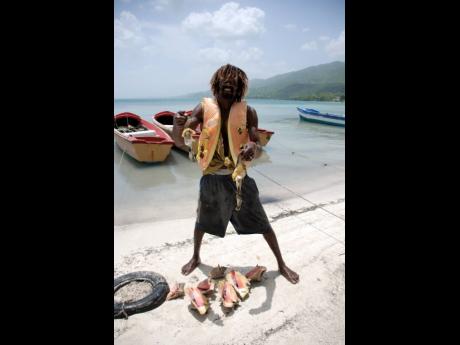Conch crisis - Depleted stock forces ministry to order one-year fishing ban
Exporters who invested heavily in retooling processing facilities to meet best-practice and traceability standards for entering the European Union (EU) and other lucrative conch markets are facing financial ruin, with a shock almost one-year ban on harvesting and exports to come into effect next month.
The ban, which will run from March 1, 2019 to January 31, 2020, is intended to give the depleted population time to replenish itself. Fisheries officials will inspect and verify stock during the first three weeks of March, after which an absolute ban will be enforced.
However, by then, some local businesses could be wiped out unless the State intervenes and presses lending agencies that financed multimillion-dollar loans to review repayment terms, at least until normality returns to the industry.
Even though the annual season runs from January 1-July 31, commercial fishers and processors usually don’t hit the water big until sometime about April. That is because they are busy ramping up operational standards in order to meet and maintain the stringent licences and permits procurement standards dictated by agencies such as the Veterinary Services Division in the Ministry of Industry, Commerce, Agriculture and Fisheries.
The financial outlay to upgrade each year, in terms of equipment purchase and maintenance, certification and staff training to meet quota requirements, runs into millions of dollars, which few can afford out of pocket.
“It will be devastating, and that’s putting it mildly,” one stakeholder told The Sunday Gleaner. “This is because most plants involved in the trade such as ours retooled, and others were specifically designed with conch processing only in mind.”
Looming loan disaster
However, given the lucrative return on investment for businesses that meet the exacting due-diligence requirements of the EU market especially, loan applications usually find favour with bankers.
Following a meeting with officials at the Ministry of Industry, Commerce, Agriculture and Fisheries, another sector interest questioned the Government’s failure to realise that drastic action had been needed to head off the looming disaster.
The irony was not lost on the seasoned commercial fisher that the initiative designed to save the marine resources could very well lead to his financial demise. That is unless the industry gets a strong helping hand.
“Our exposure to the lending agencies is tremendous, and such a ban will not only cause tremendous strain on the players to honour their obligations, but definitely cast a shadow over the viability of the facilities. In order to qualify for a quota, one has to have a boat or a processing facility,” the conch stakeholder, who requested that his name be withheld, told The Sunday Gleaner.
“So to make that sacrifice and then have access to the resource and ultimately the market restricted is a major setback. … Players will have to become creative in how they use their facilities in order to open up alternative revenue streams or fall by the wayside.”
He expressed uncertainty, however, about whether the conch stock will sufficiently multiply by the end of the close season on January 1, 2020.
“Given the importance of this national resource and what it also contributes to the national coffers, the situation is a delicate one for all parties concerned. Clearly, we can’t continue to deplete the resource unabated or, worse, allow CITES (Convention on International Trade in Endangered Species of Wild Fauna and Flora) to step in and enforce restrictions.
“I agree that there is no guarantee conditions will improve in a year or how phased the resumption will be, so we must plan long term,” he said.

